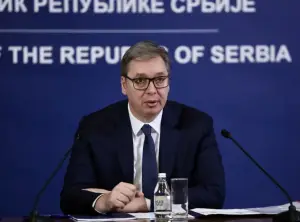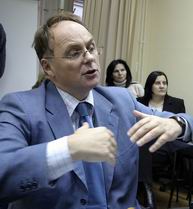- Serbia
Get to know Serbia
- Citizens
Culture and science
Health services
Pension and disability insurance
- Business
Employment
Economy
- Media
- Government
- Contact
Keep in touch
Contact form
Back
Keepin touch
Whether you have a question, comment, suggestion or any problem in the purview of the government, send us your message and we will try to respond as soon as possible. If your problem is not in our purview, we will forward your message to the relevant institution.
Q:
A:
Five percent economic growth expected in 2005
Belgrade,
28 December 2004
Director of the Serbian Development Institute Edvard Jakopin said today that the economic growth rate in Serbia next year could be five percent, depending largely on the effects of this year's privatisation.
Jakopin said at a press conference that the economic trends are good, and therefore the next year will be easier than this one.
He said that in 2004, the economy recovered slightly and it experienced an eight percent growth, the best in the last decade. However, this rate is only 57 percent of the economic growth in 1990.
The Director of the Development Institute said that the main problem next year could be pressure on prices, but that pressure will not be the result of the introduction of the Value Added Tax (VAT).
According to Jakopin, investment was one of the weakest economic indicators in 2004, making up only 25 percent of that realised in 1990. This should alert economic policy makers that the situation in this field is alarming.
Jakopin said that industrial production experienced growth after a longer period of time. From January to November this year it increased 6.9 percent in relation to the same period last year.
According to the Institute's analyses, industrial growth was mostly influenced by food industry production.
He said that fruits, vegetables and sugar made up the largest share of exports, while import of products for paper industry, chemical industry, machinery, motor vehicles and trailers mostly contributed to the trade deficit, together with coffee and seasonings.
Jakopin voiced hope that Serbia's foreign trade deficit will stand at $6.6 billion by the end of the year, while inflation will be around 12 percent.
This year, the Development Fund approved more than 8.8 billion dinars for more than 1,000 long-term investment programmes, of which 50 percent are agricultural loans, while the rest of the funds were approved to the timber, metal processing and chemical industries.
The Institute's polling on the economic situation and expectations for the next year show that out of 600 representatives of Serbian companies, 30 percent believe that the economic situation is bad, while 20 percent are optimistic about the next six months.
Almost all of the interviewees from the processing industry said that the economic situation in the country is negative, apart from those producers of cellulose and paper. Food and chemical industry producers also expect that positive economic changes will take place in the next six months.
He said that in 2004, the economy recovered slightly and it experienced an eight percent growth, the best in the last decade. However, this rate is only 57 percent of the economic growth in 1990.
The Director of the Development Institute said that the main problem next year could be pressure on prices, but that pressure will not be the result of the introduction of the Value Added Tax (VAT).
According to Jakopin, investment was one of the weakest economic indicators in 2004, making up only 25 percent of that realised in 1990. This should alert economic policy makers that the situation in this field is alarming.
Jakopin said that industrial production experienced growth after a longer period of time. From January to November this year it increased 6.9 percent in relation to the same period last year.
According to the Institute's analyses, industrial growth was mostly influenced by food industry production.
He said that fruits, vegetables and sugar made up the largest share of exports, while import of products for paper industry, chemical industry, machinery, motor vehicles and trailers mostly contributed to the trade deficit, together with coffee and seasonings.
Jakopin voiced hope that Serbia's foreign trade deficit will stand at $6.6 billion by the end of the year, while inflation will be around 12 percent.
This year, the Development Fund approved more than 8.8 billion dinars for more than 1,000 long-term investment programmes, of which 50 percent are agricultural loans, while the rest of the funds were approved to the timber, metal processing and chemical industries.
The Institute's polling on the economic situation and expectations for the next year show that out of 600 representatives of Serbian companies, 30 percent believe that the economic situation is bad, while 20 percent are optimistic about the next six months.
Almost all of the interviewees from the processing industry said that the economic situation in the country is negative, apart from those producers of cellulose and paper. Food and chemical industry producers also expect that positive economic changes will take place in the next six months.
-
 Belgrade, 23 December 2025
Belgrade, 23 December 2025Enhancing implementation of IPARD III programme
-
 Belgrade, 12 December 2025
Belgrade, 12 December 2025Construction of gas interconnector with North Macedonia by end-2027
-
 Belgrade, 8 December 2025
Belgrade, 8 December 2025Enormous public interest in registering illegal facilities
-
 Belgrade, 8 December 2025
Belgrade, 8 December 2025State doing everything to preserve stability of energy supplies
-
 Belgrade, 5 December 2025
Belgrade, 5 December 2025State doing everything to avoid shortage of oil derivatives
-
 Belgrade, 2 December 2025
Belgrade, 2 December 2025Serbia has not received positive decision from US over NIS
-
 Belgrade, 2 December 2025
Belgrade, 2 December 2025Spanish companies invited to invest in Serbian agriculture
-
 Belgrade, 26 November 2025
Belgrade, 26 November 2025Highest level of cooperation, information exchange with Hungary in field of energy
-
 Belgrade, 25 November 2025
Belgrade, 25 November 2025OFAC’s decision on NIS licence in next four days
-
 Belgrade, 24 November 2025
Belgrade, 24 November 2025State to maintain stability of oil derivatives supply

